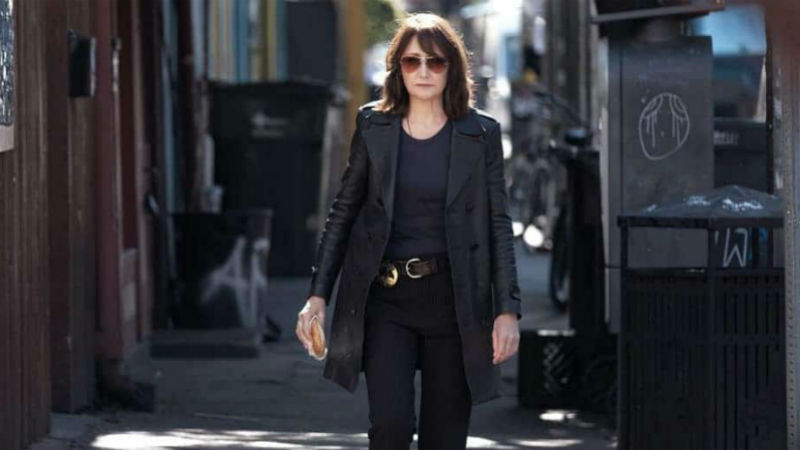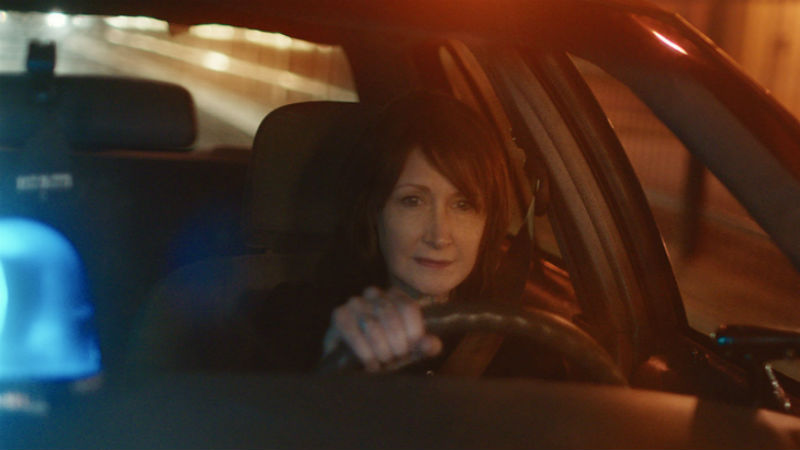QUICK SNAP: LIVE FROM TALLINN
The eponymous Roxy is a fight dog who has so far killed 12, no… 14, dogs. For no good reason, he bites a pedestrian’s hand, causing his walker to hand a wad of banknotes to seemingly unflappable, hired taxi driver Thomas Brenner (Devid Streisow) to straighten the situation out. Then his new fare has put Roxy on the back seat, his panting head inches away from Thomas’ face. “You have to buy a muzzle for this dog,” Thomas calmly explains to his fare. “It’s the law in Germany.”
Thomas, whose working life consists of picking up a fare from the railway station, taking them where they want to go, and then returning to the station to pick up the next fare, loves routine and order. In his intermittent voice-over running through the film, we learn that his grandfather was in the Wehrmacht and his father the Stasi, the latter eventually committing suicide in 1990. He has learned from his late mother to never look people in the eyes, a survival mechanism, a way of remaining invisible.
In his flat, his inherited collection of die-cast model cars and motor vehicles sits in lovingly sorted, pre-arranged positions on wall-mounted ornament shelves. His set of dice sit in ordered rows on his pristine tray except when he rolls them for his own amusement, always replacing them in exactly the same place. The tray is covered in tiny images of iconic, naked women, occurring at regular, spatial intervals. He often visits the local bar for a quiet drink, where conversations with latent nymphomaniac barmaid Sara (Valliamma Zwigart) inevitably end in sex.
His latest fare, though, is set to turn his highly ordered life routines upside down. Levan (Vakho Chachanidze) and his friends are criminals or gangsters or some such, we never find out exactly what, but clearly not to be messed with. Levan is impressed with Thomas’ ability to stay cool under pressure, pays well and offers more work. A ride or two later, he’s joined by his pretty, young wife Lisa (Camilla Borghesani) and young son Vova, eight (Raphael Zhambakiyev). Vova asks a question: which is stronger – lion or tiger? It’s a question that sets Thomas thinking.
And then one night, they’re in a restaurant and someone attempts to shoot them. Whatever their history is, these people are on the run and their pursuers are close behind. At this point, Thomas might try to extricate himself from the situation, but he doesn’t. Levan is impressed that Thomas never asks about his background but simply does whatever needs to be done. Above all, Levan is concerned not for himself but for his wife and son. Thomas finds the group a safe house. And Levan offers Thomas a piece of advice about dealing with animals which flies in direct contradiction to his mother’s: always look them in the eyes.
In the scenes that follow, Thomas is asked by Levon to help them obtain fake passports. Surely there must be someone he knows who knows someone who knows someone. Thomas starts asking around to see what he can do. Then he is contacted by people claiming to be agents of a foreign power in pursuit of these men, who want him to help them. They, too, pay well. The only way he is going to survive is by playing one side off against the other, which could prove quite lucrative. What’s more, Thomas gets on really well with Vevo, and Lisa is a very attractive woman…
Also in the picture are Levan’s underlings Andrej (Ivan Shvedoff), Niko (Nicolos Tsintsadze) and the none too intelligent Sasha (Sandro Kekelidze) not to mention a troupe of avant-garde theatre actors who do a nice sideline in fake passports – among them a woman in a blue bodysuit with a fake penis and a truly fearsome, blonde-bewigged man (Waléra Kanischtscheff) sporting a turquoise pantomime dress.
Not only is this one of the most cleverly plotted and executed thrillers in years, which never misses a trick, it’s also about some very interesting ideas. What exactly is power, and how is one person able to wield it over another? When is the time to do as you’re told, and when is the time to strike out and take decisive action? Which is stronger – lion or tiger? We follow Thomas’ journey as he moves from invisible everything-in-its-right-place man towards something far more dangerous, brilliantly expressed in Streisow’s superb performance.
The film is a masterclass in casting, with a superb clutch of performances from the various supporting cast members, including the small boy and, for that matter, the dog. It’s also flawlessly structured, shot and edited. And consistently inventive to boot.
Moreover, it’s a welcome addition to that small, select subgenre of the taxi driver movie which includes such seminal outings as Taxi Driver (Martin Scorsese, 1976), Taxi (Carlos Saura, 1996), Collateral (Michael Mann, 2004) and A Taxi Driver / Taeksi Woonjunsa (Jang Hoon, 2017). Collateral, in which a mysterious stranger arrives into town and hires a taxi driver to drive him around, probably the closest to it. The film is a real winner and distributors should be falling over themselves to acquire it in territories round the world. An utterly enthralling, stunner of a thriller which deserves to be a massive, worldwide hit. Don’t miss.
Roxy plays in Tallinn Black Nights Film Festival. Watch the trailer below:










